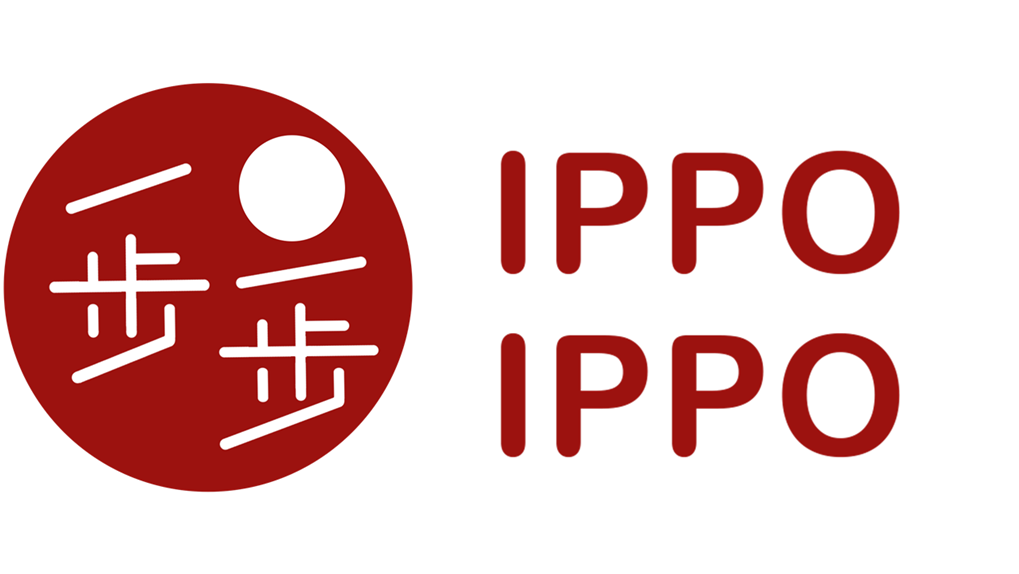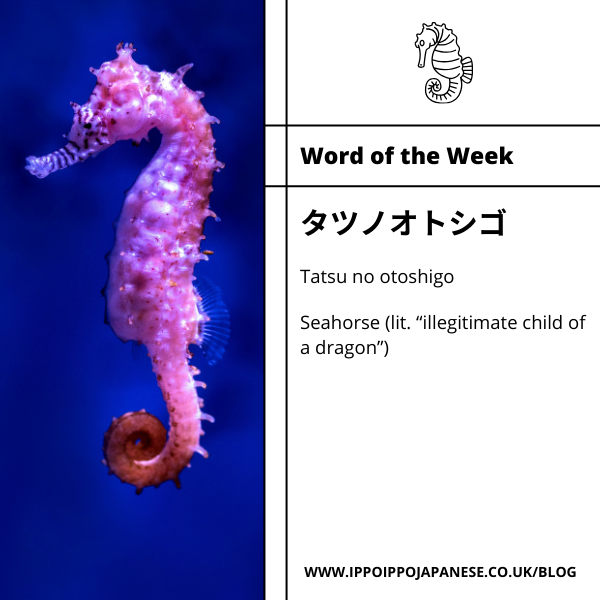Photo credit: David Clode
Posted: 8th Nov 2023
Hello and welcome to the Ippo Ippo Japanese Word of the Week!
As I'm currently suffering from a slight wrist injury, I haven't been able to do much longer form blog writing of late. However, the good news is I've found something that's not only fun and brief(ish - I may have got slightly overexcited while writing this) to introduce, but also seasonal!
Read on to find out why...
This Week's Word Is...
タツノオトシゴ
- In hiragana: たつのおとしご
- In rōmaji: tatsu no otoshigo
Before We Begin
None of the links in this post are affiliated, which means I don't make money via companies like Amazon when you click on them. If you'd like to support the blog with a donation (however small!), you can do so via Ko-fi.
What Does タツノオトシゴ (tatsu no otoshigo) Mean?
タツノオトシゴ (tatsu no otoshigo) means "seahorse". While (like many species/scientific names) this is commonly written using katakana, it can also be written in kanji as 竜の落とし子。
The meaning of these words are:
- 竜 (tatsu) - dragon
- の (no) - a possessive particle meaning something close to "of"
- 落とし子 (otoshi go) = illegitimate child
So: a seahorse in Japanese is an "illegitimate child of a dragon"!
How Do You Pronounce タツノオトシゴ (tatsu no otoshigo)?
Visit Forvo to hear examples of how to pronounce this word.
Why is "Seahorse" the "Illegitimate Child of a Dragon" in Japanese?
When it comes to the origin of this word, the popular consensus appears to be that the name is mostly derived from the visual similarity between seahorses and dragons. This website goes a little further in its explanation, suggesting that seahorses - who, after all, don't look like many other sea creatures - must have come from a dragon giving birth while flying over the ocean.
Indeed, seahorses are not the only fish (for they are indeed fish, it would seem) to be compared to dragons in Japanese: see also タツノイトコ (tatsu no itoko - cousin[s] of the dragon).
How to Use タツノオトシゴ (tatsu no otoshigo) in a Sentence
Let's take a look at a couple of potentially handy phrases involving seahorses.
Example Sentences
- タツノオトシゴは特別な生き物です。(Tatsu no otoshigo wa tokubetsu na ikimono desu - Seahorse are special/extraordinary creatures)
- 水族館*でタツノオトシゴを見ました。(Suizokkan de tatsu no otoshigo wo mimashita - I saw a seahorse at the aquarium)
*If you look up the reading of 水族館, most dictionaries will give "suizokukan" rather than "suizokkan" as the first reading. While this may be considered more "correct" by some, in my experience "suizokkan" is by far the more common pronunciation.
What Makes Seahorses Seasonal?
This being November, I've been starting to look into 年賀状 (nengajō - Japanese New Year cards), which are typically decorated with the zodiac animal of the new year, which nowadays in Japan begins at the start of January.
As 2024 is the Year of the Dragon, this is actually what led me to writing this post, as looking up images of 年賀状 (nengajō) for 2024, I got pretty confused by the fact that several featured seahorses!
Why might this be?
According to Wikipedia (rough English translation below):
毎年の年末年始はその年の干支にあたる動物がメディアで取り上げられるが、辰年のだけは架空の生物であるため、代わりにタツノオトシゴが取り上げられることがある。
Every year during the New Year holiday season, there is media coverage of the zodiac animal for the coming year. As the Year of the Dragon is the only one with a fictional animal, seahorses are sometimes talked about instead.
My interpretation of this is that it's partly the desire to show real-life animals (e.g. with aquarium footage on TV), as well as just a bit of fun wordplay!
If you were to design a 年賀状 (nengajō), would you decorate it with dragons or seahorses?
Bonus Notes: Seahorse Dads in Japanese
Finally, when researching this word, I was curious as to whether the term "seahorse dad" (usually referring to a transgender man or nonbinary transmasculine person who gives birth, as male seahorses do) had carried over into Japanese.
The first thing I found related to seahorses and dads was this children's book called とうさんはタツノオトシゴ (tō-san wa tatsu no otoshigo - My Dad's a Seahorse). While it doesn't seem to have anything to do with seahorse dads per se, it does appear to introduce the idea of actual male seahorses giving birth, with a message that the website description suggests leans towards encouraging dads to be more involved in child raising. Nice!
As for its prevalence as an LGBTQ+ term, while I may well be missing something, as far as I could tell through an internet search, "seahorse dad" doesn't seem to be widely used. I did, however, find some translations of the English term in articles like this one, with the Japanese translation being タツノオトシゴ パパ (tatsu no otoshigo papa).
Incidentally, there is a Japanese show on Netflix called "He's Expecting" (ヒヤマケンタロウの妊娠 - lit. "Hiyama Kentarō's Pregnancy"), but this revolves around the idea of a cisgender (i.e. transgender) man getting pregnant.
You've reached the end of this post! I hope you enjoyed it.
For updates on posts like this sent straight to your inbox, sign up to my newsletter (sent no more than once a month):

Support Me on Ko-fi
If you've enjoyed this and would like to see more like it in future, please consider sending a donation - however small! - via Ko-fi. I don't include any affiliated links or ads on my website, so every little helps!
Please donate via the portal below or by going directly to the Ippo Ippo Japanese Ko-fi page.







